#Madeleine was the person Armand really feared
Explore tagged Tumblr posts
Text
I’ve seen a lot of takes on this scene, and honestly they’re all so interesting, so I decided to give my perspective.
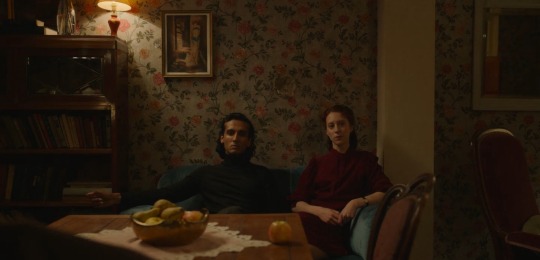
Okay, starting with Armand’s costume, which Carol Cutshall absolutely nailed. Here’s what she said about Armand’s costume design:
—“One of the things about Armand is he is so ancient and so powerful that he always presents himself as very open. Whereas some of the other characters are very covered up, he’s always very open because he really doesn’t see anyone as a threat to himself. He didn’t have any predators or any reason to be on guard, or be armoured.”
Personally, I find this design choice fascinating because, despite being a predator at the top of the food chain, vampires like Armand, especially as a coven leader, would normally need to remain vigilant. Yet, he’s completely at ease, even surrounded by other vampires.
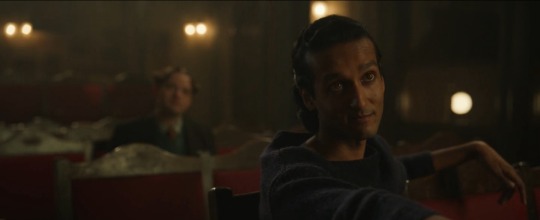
I mean, look at him here. Sure, it’s not the deep, open V-neck shirts he wears in the interview scenes, but his outfit is still loose and open. And he’s literally surrounded by a group of vampires he knows are plotting against him. He even has his back to said vampires and yet, he’s not the least bit nervous in either situation!
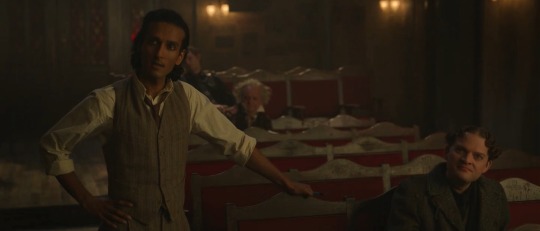
Even with Daniel, he’s not nervous or afraid because he doesn’t initially see him as a threat.
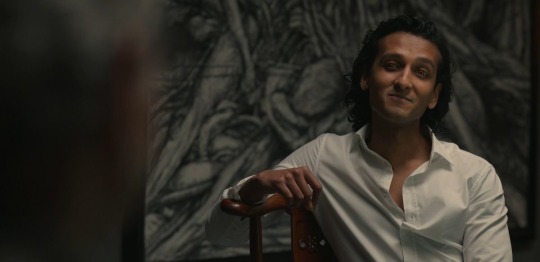
So, if Armand isn’t scared of his own coven—a bunch of vampires ready to kill him at the first opportunity—or Daniel, who could potentially expose all his manipulations, then why on earth does he go into full armor mode to meet a seemingly inconsequential human he’s never encountered before? He’s literally in a turtleneck, shielding his most vulnerable area for crying at loud!
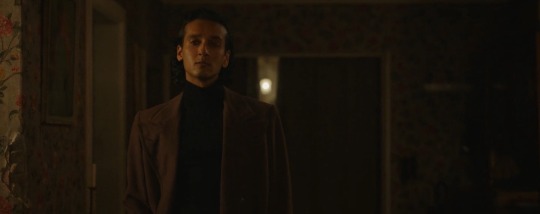
A for body language—honestly, Assad Zaman deserved an Emmy for this scene. We see Armand being aloof, a little suave and condescending, employing the whole, “I’m a four-century-old vampire; you’re just a lowly human” tactic. It’s like he’s sizing her up, wanting to understand who she is while simultaneously aiming to provoke her, curious to see how she will react.
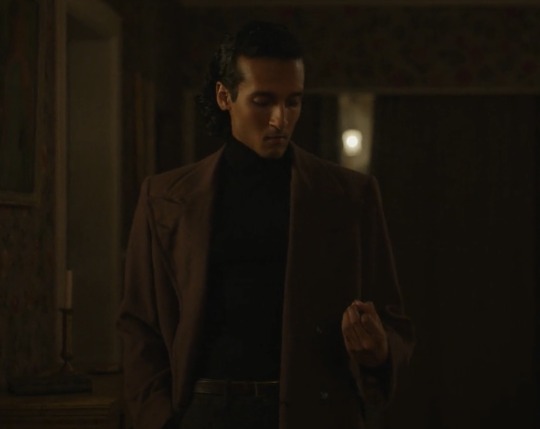
As for his questions, he frames them in the way you might expect a coven leader to interrogate a human he’s about to turn. Questions like, “How will you survive? Are you okay with killing people and being a monster?” It almost seems like he’s trying to make her reconsider her decision to turn, but it’s all a facade.
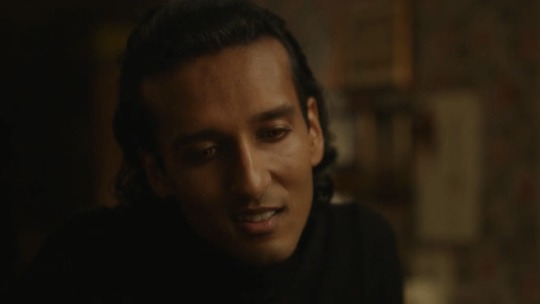
Because the question he really wants to ask is the last one, and when he finally approaches it, his entire demeanor shifts.
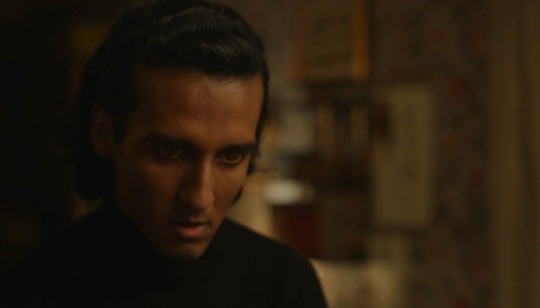
He sheds the suave demeanor and shifts to a more serious tone, embodying what Louis describes as his "post-apocalyptic look." He towers over Madeleine, gazing down at her in an attempt to intimidate. At this point, Madeleine's expression turns genuinely nervous, perhaps even frightened—and understandably so. Yet, she holds her ground. It's then that Armand poses the crucial question he had come specifically to ask.
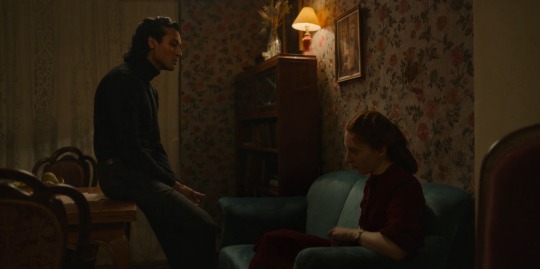
“And what will you do in a few decades when she throws herself into the fire? Because she will.”
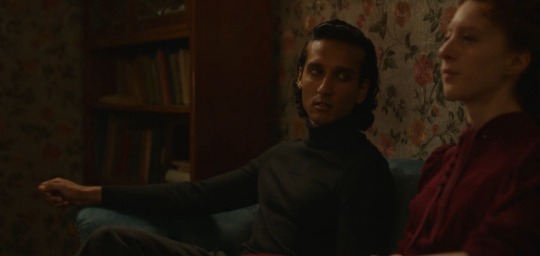
Now, why does this question seem familiar? It’s because Armand has previously made a similar statement to Louis. He had forewarned Louis that Claudia’s mind was bound to deteriorate over time. Now, Louis tearfully countered that Armand couldn’t be sure of this, yet part of him probably recognized the truth in Armand’s words, which likely contributed to his emotional plea for Armand to look after her.
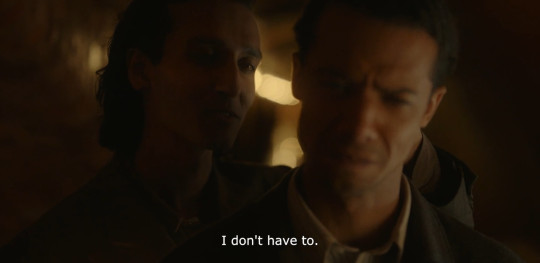
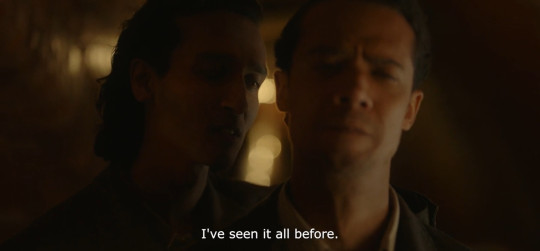
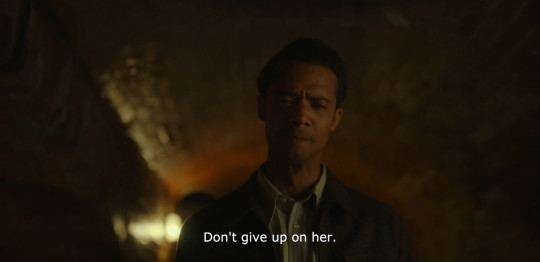
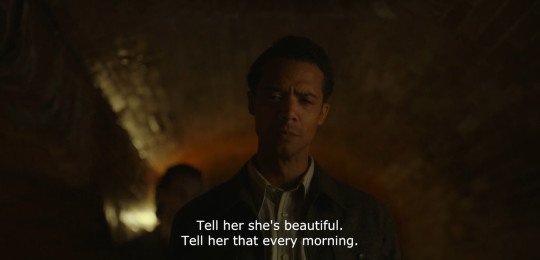
Armand realized then that Louis, despite his deep love for Claudia, lacked the resolve to keep her grounded, effectively sealing her fate, which seemed all but inevitable by that point. He even assigns Claudia the role of Lulu as a way to infantilize her and further break her spirit—almost as a test to gauge Louis’ reaction. Unfortunately, Louis does nothing about it, while Madeleine clearly recognizes it for the manipulation it is.
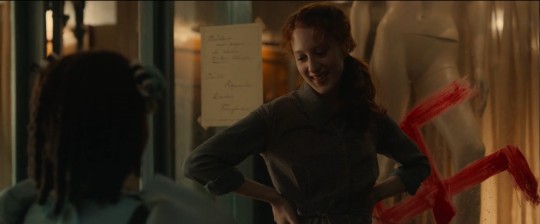
And what does she do next? Madeleine quickly gets Claudia out of that outfit and into one more fitting for her. By doing this, she threatens Armand’s plans without even realizing it.
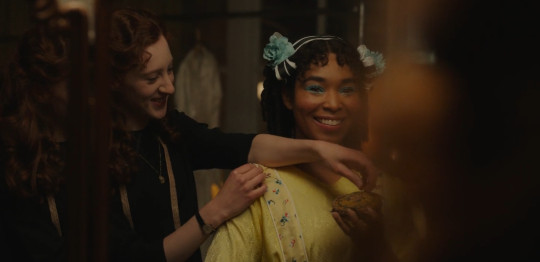
It’s also interesting to note that the only time Armand is ever truly angry with Claudia is when he sees her with Madeleine. This reaction underscores the threat he perceives in their bond, disrupting his control of the situation, and here is why.
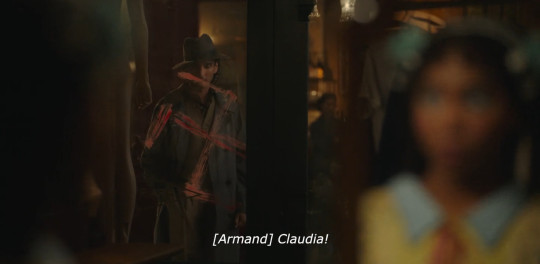
When Armand posed the question to Madeleine about what she would do when Claudia throws herself into the fire, her response was:
“Or maybe she won’t. You don’t know. Maybe I’m what she needs to survive.”
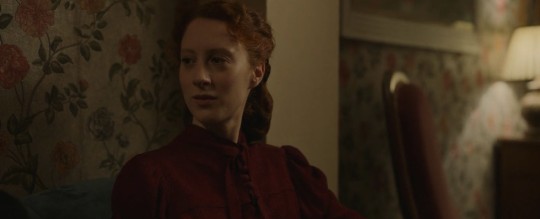
And the way she meets his gaze as she says this marks a shift in their conversation. Throughout their entire conversation, Madeleine often looks away and breaks eye contact, but not in this moment. Here, she meets his gaze head-on. Even though she is clearly nervous, and likely a bit scared, she holds his gaze because she is sure of her words. This is a powerful moment where Madeleine not only asserts her belief but also turns the tables—now, it’s Armand’s turn to feel uneasy.
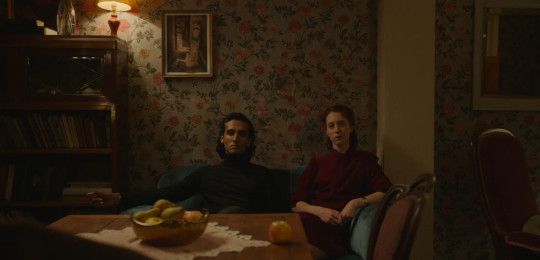
Of course, you don’t see it in his face, but it’s evident in his body language. The way he becomes closed off, his hand fidgeting, and his gaze fixed ahead as if deep in thought. He doesn’t even refute her.
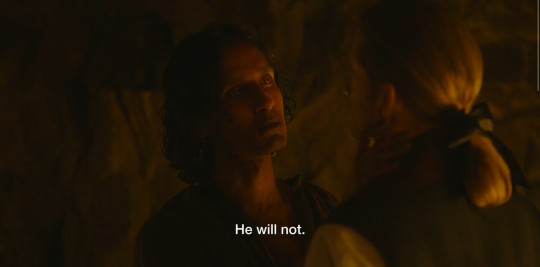
Even with Lestat, when he warns him about Nicky, Armand doesn’t stay silent; he confidently affirms his insights, and Lestat—of all people—clearly believes him. But with Madeleine, it’s a different story. He goes silent, not uttering a word in response. He doesn’t attempt to persuade her because he recognizes that her mind is made up, her resolve unshakable. But perhaps the words that really hit home for him were “You don’t know.” This was probably the words that sealed Madeleine’s fate because the last thing you want to say to a master manipulator and control freak like Armand is that they don’t know something. Because now, all of a sudden Claudia’s death isn’t a certainty anymore and he can’t just sit back and wait for her to lose her sanity. He must take matters into his own hands now.
Anyway, one might think that Madeleine and Claudia leaving, thereby leaving Louis all to Armand, would satisfy him. After all, one of the first things he asks Claudia and Madeleine is if they’re considering returning to Paris, and you might assume Madeleine’s answer pleased him. However, her answer doesn’t satisfy him, not after what Madeleine says soon after.
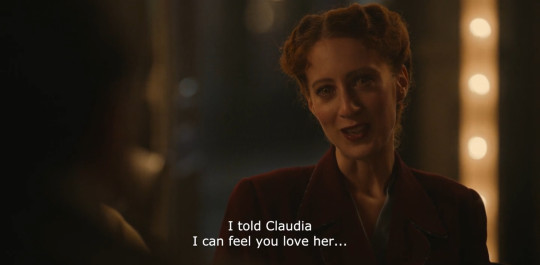
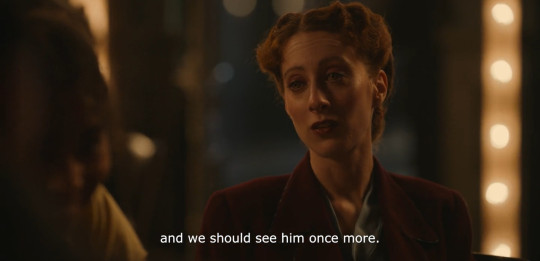
Madeleine’s words confirm that Claudia indeed loves Louis, and because Madeleine loves Claudia, she persuades her to return to Paris despite her obvious and valid disdain for the city. This revelation proves to Armand, even if they leave Louis, Madeleine and Claudia will always remain a significant part of Louis’s life. For Armand, this is intolerable. To him, Claudia is a dangerous manipulator and a competitor of Louis’s attention.
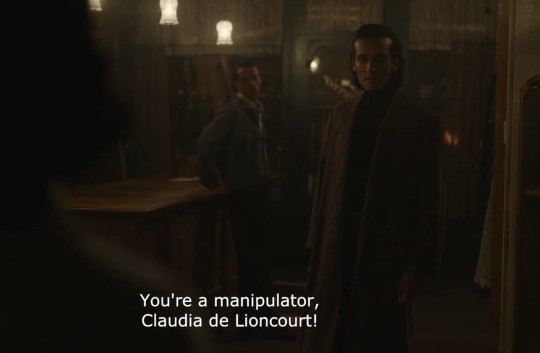
So even if they all lived happy, separate lives, Armand’s nature is such that he cannot live with the doubt and fear that Claudia might draw Louis away from him. Having been abandoned too many times in his life, deeply wounded by those closest to him, and left behind for others, he cannot risk experiencing that pain again.
Thus, in that moment when he speaks to Madeleine in the apartment, he decides that both she and Claudia need to be eliminated. I believe this was the real reason Armand was there under the pretense of turning her. He needed to evaluate how much of a threat Madeleine posed to his plans, and upon realizing she was basically a live grenade, he knew he needed to act swiftly to get rid of her. Because as long as Madeleine is present, so will Claudia, and as long as Claudia exists, Louis will never truly belong to Armand.
#iwtv#amc iwtv#my take on S0206#interview with the vampire#thank you for listening to my rant#iwtv armand#madeleine#Madeleine was the person Armand really feared#Love her for that#interview with the vampire book spoilers#amc interview with the vampire#assad zaman#give Assad Zaman an Emmy for this#analysis#Interview with the vampire analysis
362 notes
·
View notes
Text
i neeeeed to know what was going through armand's mind when he made daniel. like, not even about him really, more regarding the actual act of making a vampire.
armand says the idea of that repulsed him in general, and that fledglings will always come to despise their makers, but there's also another risk brought up a few times by him that could be a genuine fear: that fledglings might not "take" to the gift. he tries to sway louis from turning madeleine by telling him "it could fail", that she could turn into one of "those drooling revenants", and later has to ask if she took. he had asked lestat if nicki took, too. but he knew he couldn't have; too unstable, too fragile; he would not rise out of it and he would never flourish.
did he think about that while he was turning daniel? what if he did it wrong? what if daniel couldn't handle it and he died or went mad? if it was purely a spiteful act, did armand even care about the outcome? but louis' words were ringing in his head regardless of if he personally did or didn't: "you harm him in any way and i will kill you." if daniel didn't take, what would that mean in louis' eyes?
#i mean more specifically louis does say not to touch him. and he very much does touch him#and its kinda unclear whether turning someone into a vampire (out of spite) counts as 'harm' to louis right now#but. still#i think armand would be feeling some kind of anxiety for multiple reasons throughout the whole process#even if hes not really thinking and just starts biting#iwtv#armand
46 notes
·
View notes
Note
If you stuck those bloodsuckers on a one way trip to Gotham, who do you think is getting into a midnight brawl in a gas station parking lot and who's having a candlelit dinner at the Iceberg Lounge? Also, the kittens say hi!!! <3
hi to the kittens buddy!!!!!
Louis de Pointe du Lac is probably making it to the iceberg for that fancy rooftop terrace dinner, at first as a potential mark for Selina Kyle (but he doesn't swing that way and they'd probably hit it off so perfectly they wind up being best friends).
Lestat would piss everyone off (but particularly Joker and Music Meister), and somehow winds up crashing the dinner at the Lounge so he can show up on the piano in some over the top gesture for Louis. The Penguin and probably several others, both hero and villain, are in hot pursuit.
In an ideal world, it would be a Claudia and Madeleine + Harley and Ivy double date, but given they're all such strong personalities, I doubt they'd get along all that well - Claudeleine would wind up on a killing spree that doesn't really put plants at the forefront with continual asides about what the fuck is up with these weird get-ups in this town and mon dieu you américains avez des fétiches bien bizarres. (As an aside, Claudia has strong parallels with BTAS' Baby Doll, but she doesn't show up enough for me to suss out a way for them to meet lol)
Armand being who he is would get extremely, extremely into 1) figuring out if the man who dresses up as a Bat is in fact a vampire or not, and 2) fixated on solving every single one of Eddie's Riddles to 100% completion. He would then engage in something that would make whatever saw trap Riddler came up with look like child's play, possibly on the question mark guy himself.
As for the old man? Daniel cannot get along with a soul (he once attended a guest lecture on the science of fear at Columbia university to heckle the presenter on dubious funding/ties to the League of Shadows), but his old student Vicki emailed him telling him he wouldn't believe what goes on in this city, and, well, he's never one to step away from a tempting lead like that, even in his semi-retirement.
27 notes
·
View notes
Text
Season 2x08 Thoughts (pt 1?): Armand
My biggest gripe with the finale (which also had a lot I loved) is the "twist" that it was Lestat who saved Louis at the trial rather than Armand and that Armand intended for Louis to die. I'll preface this by saying that I was not going into this episode deluded into thinking Armand isn't a monstrous creature. Hell, going into season 2 I was really hoping to see the frankenclaudia experiment as described in The Vampire Armand on screen. I also was looking forward to Louis and Armand's divorce; their simple separation after years of them both retreating inwards becoming shells of people, barely speaking to each other but being too cowardly to leave for 70 years is one of the fascinating parts of the book to me.
Yes, Armand always directed the play (in the book's case scripted Lestat in the trial), but his motivations have been greatly altered in the show in a way that feels less compelling and to a degree flattening, of course, though this is impacted by personal taste. In the book(s) Armand's actions during the trial (and beforehand psychically manipulating Louis to turn Madeleine) are done out of a warped perception of love in part based in ownership and isolation. Armand views Claudia as he does most others that he does not love, as an insignificant pawn, in this case, an obstacle for Louis' "growth" and and obstacle in the way of their relationship. He genuinely believes that by enacting the cruelty of Claudia and Madeleine's deaths he can isolate Louis into loving him entirely. He states plainly before the trial (when it's already been set in motion):
"She's an era for you, an era of your life. If and when you break with her, you break with the only one alive who has shared that time with you. You fear that, the isolation of it, the burden, the scope of eternal life." (pg 221)
and after the trial:
"I used to believe you would get over it, that when the pain of all of it left you, you would grow warm again and filled with love, and filled with that wild and insatiable curiosity with which you first came to me, that inveterate conscience, and that hunger for knowledge that brought you all the way to Paris to my cell. I thought it was a part of you that couldn't die. And I thought that when the pain was gone you would forgive me for what part I played in her death. She never loved you know. Not in the way that I loved you, and the way that you loved us both. I knew this! I understood it! And I believed I would gather you to me and hold you. And time would open to us, and we would be the teachers of one another. All the things that gave you happiness would give me happiness; and I would be the protector of your pain. My power would be your power." (pg 260)
Armand is desperate for Louis (bringer of change, embodying the 19th century) to continue to love him past their early infatuation to be Armand's new window into the world and a replacement for Marius (embodiment of the Renaissance) and Lestat (the 18th century which has already rejected him). His longing for that all-consuming companionship characterized by isolation, manipulation, and ownership becomes most implicitly clear I think when Armand speaks nostalgically about Venice, "I wish I had the artist's power to bring alive for you the Venice of the fifteenth century, my master's palace there, the love I felt for him when I was a mortal boy, and the love he felt for me when he made me a vampire. Oh, if I could make those times come alive for either you or me . . .for only an instant!" (pg 222) (in a way the trial and subsequent isolation IS him trying to make those times come alive)
Ultimately Armand's greatest transgression, the murder of Claudia, is born out of selfish and twisted love for a man (who he has incorrectly perceived as full of endless curiosity and wonder) who he has placed the weight of his world onto. Before the trial even begins he says, "No, I've had to wait and watch for you. And now I'll fight for you. Do you see how ruthless I am in love?" (pg 223)
However, in the show, his transgression is the attempted destruction of LOUIS along with Claudia, and Madeleine. Rather than being born out of selfish love and desire, it is instead born out of Armand's passivity to the status quo (which he clearly wavers on and struggles with as seen by the the Lourve scene, his look of regret outside the restaurant following the judas kiss, and his eventual taking Louis from the coffin). But to me, this aspect of Armand is just as well commented on and explored in an ending closer to the novel in that an orchestration of the end of the coven or a seeking for connection with the age can not be done through himself but only through another acting as a savior. Another compounding possible motivation for Armand's actions is the belief that Louis does not love him and never will love him in the way he needs, and this is him cutting his losses by preserving the coven. This would fit well with the look of guilt and regret outside the restaurant as it immediately follows confirmation from Madeleine that Louis does in fact love him but is withholding. His look could be read as a realization of miscalculation. However, frankly, I don't think that this angle is really explored or built up strongly within the season. And I think that's at least in part because I don't think that their dynamic and its strengths and flaws in the Paris era had enough room to breathe this season. In the last few episodes, their relationship in that era felt to some degree sloppily ill-defined. Ultimately I think that not enough was gained in the twist when it caused Armand's ruthless love to be lost.
Also, I HEAVILY dislike that the reveal comes by way of the Talamasca rather than organic probing from Daniel and Louis leading to a confession from Armand. (I honestly haven't loved most of the Talamasca use this season in general and think the organization is better suited to show up in more general investigative work like with Jesse Reeves in the books rather than in the context of interfering with the interview which felt much more intimate and contained without it). I find Armand's admission of his role in the trial to Louis in the book born out of an attempt to bait Louis into feeling SOMETHING even if it was rage at him after decades of them both living in monotonous misery infinitely more interesting than Daniel being given a file with the answers. I don't think that the reveal needed to play out exactly like in the novel, but if they were going to change it, I wish it had been to another equally strong character moment instead of Talamasca bullshit. Part of me wishes that this season had had another episode because the finale just had so much it needed to include and balance that this cop-out almost feels as if it was born out of necessity to keep everything within runtime.
Anyways, I adored the burning the coven segment, I'm happy Daniel's a vampire, and I really liked the Loustat reunion scene even if I don't love how we got there. I didn't originally intend to post any thoughts on the episode until after my second watch later tn with some friends but it was plaguing my mind so this is the initial ramble. Might have more to say late tn or tomorrow.
#iwtv#interview with the vampire#the vampire armand#louis de pointe du lac#loumand#sorry if this has way too many clarifying statements#vampire chronicles
31 notes
·
View notes
Text
I've been rewatching IWTV and what's clicked for me were Armand's motivations for betraying Louis. On first watch I thought it was such a confusing and irrational thing to do. Now, obviously it was capital B Bad etc., but we all know that, boring question. But was it a logical (≠justified) decision to pick the coven? I'm starting to think it kind of was 🤔
The café scene is so heartbreaking, makes me kick and scream at the screen, Armand on his way to end it all and Madeleine asks why Louis doesn't want him to know how much he loves him, and Louis confidently replies, “he knows.” Reader, did he know? I feel like part of the tragedy is that it didn't really matter at that point.
Press pause on the betrayal of it all and look at the facts from Armand's perspective:
Louis is suicidal. He has an expiry date, the coven vampires don't. Louis is suicidal, the coven is forever 😂😂 To quote Lestat, “There is one thing about being a vampire that I most fear above all else... And that is loneliness. You can't imagine the emptiness, a void stretching out for decades at a time.” Armand asks Madeleine, “What will you do, in a few decades, when she throws herself into the fire?” and then finds Louis in a pool of blood, his wrist slashed. He voices this to Louis much later – when he has no right to demand anything from him, but the sentiment stays true – “You left me for death. Will I be on suicide watch for the next 1,000 years?”
Louis straight up murdered his previous lover. Now, we know it wasn't all that, but Armand didn't. Major red flag, anyone? “I killed him and he fucking had it coming.” And he DID, but that's beside the point, isn't it? Especially since we know Armand is just as capable of domestic abuse :') He knew that Louis wasn't the kind of person who would just take his shit forever. If you want somebody to trust you, don't let them know you took part in the murder of your ex, heartfelt advice from both of them.
Speaking of exes, Louis is SO not over Lestat. I mean, neither is Armand, they're such a train wreck of a relationship :D But yeah, Louis is not fully committed to Armand, denying publicly that they're companions, hallucinating his ex in the bedroom or while Armand is sharing his traumatic past and, most damning of all, refusing to join the coven.
From Armand's perspective, he's risking it all for Louis and Louis a) doesn't appreciate it at all, and b) refuses to do the bare minimum of getting along with his family. (If someone treated my daughter-sister the way Armand treated Claudia, I'd kill them with my bare hands, but Louis acts like he doesn't mind. Can you imagine me without the burden of her? :/) (and yeah, he could just leave his shitty cult, the same way they could have left each other during those 70 years. Shitty stability > loneliness, I guess.)
A minor point maybe, but the moment you know that Lestat is out there and wants revenge, that only adds to the expiry date part. Especially once Lestat is cooperating with the coven, because I imagine that while Armand is OP enough to fight the coven, all of them + Lestat might be a bit too much. Maybe Armand even hoped once Louis is out of the picture they could get back together? We don't really know what exactly was going on behind the scenes but Lestat's sheer existence is bad for loumand... It is what it is.
And Louis just... repeatedly ignores Armand's warnings. I mean, they both knew Armand was going to execute him that one time. They tried to make it work but Louis was living on borrowed time from that point. Add Armand's apparent MO of “everything I love must eventually burn down so I will take control of the situation by orchestrating the downfall myself” et voilà. He was given a choice and he chose.
And THEN he betrayed the coven for Louis at his most unwell. Iconic!
#knees deep in the betrayal script is it casual now#loumand my beloved <3#nobody does it like them and nobody should#iwtv#iwtv meta#u#I've been informed that the coven vampired used to have an expiry date before Lestat told them that rule was stupid. oh well#I want to clarify that I don't think any of it was Louis' fault#(except for keeping secrets from Claudia. that was extra stupid of him)#I just want to understand why A would do him that way.#and I say 'him' bc obviously he didn't give a single fuck about the claudeleines he just wanted them gone#loumand
25 notes
·
View notes
Note
Has anyone done a breakdown of what will be coming in each episode this season?
People seem to be really looking forward to episode 5 and 6... I cant remember what people think will be coming in those episodes.
You mean predictions? I've seen a few around when the episode titles dropped yes.
Personally this is where I am at now:
Episode 4 - further descending into coven life and dark relationships. Jacob said it would go darker from here and I believe him 😬 Friction between the coven, Santiago, Armand and Claudia. Dubai gets a bit sharper because Daniel has some knowledge at his hands now.
Episode 5 - called the bottle episode - I think it will be mostly DM in San Francisco (and Daniel remembering the horror in Dubai), but I bet there will be... quite some revelations wrt Louis as well. Supposedly so intense that one forgets to breathe (really looking forward to it, but I BET this will be "an episode 5" once more, lol)
Episode 6 - since this is the last episode given to the reviewers I think this is the one that will see Madeleine turned, and ending with the trial. Because the trial... will be a big, big event and things need to happen before it goes down. Alliances in Dubai are forming (between Louis and Daniel)
Episode 7 - the trial. Version one. Aka Lestat strutting his stuff blaming them. Claudia's diaries will make an appearance in some kind of form. Santiago will use the knowledge and trust he gleaned from and built with her to condemn her. Armand will let it happen. Louis will be entombed. Claudia and Madeleine sentenced to death. I think we will see them burn in this episode. This episode will have the "episode revisits to episode 5 and 7" we were promised, imho, and it won't be pretty.
Episode 8 - something breaks. Not sure what and how, but I bet we will see the contested NOLA meeting, and then probably the truth about the trial. The truth about Claudia's death, too, likely. That, and the reveals about the revisits and the diaries will drive Louis to suicide, imho. It will also be the episode where Daniel remembers not only the horror... but the love. It will end somehow with Lestat awakening/showing up and I fear it will go out with a cliffhanger of epic proportions.
So that is my expectation, and my two cents. :)
We'll see how it will hold^^
#Anonymous#ask nalyra#iwtv s2#iwtv#amc iwtv#interview with the vampire#interview with the vampire s2#amc interview with the vampire#interview with the vampire amc#iwtv amc#predictions
33 notes
·
View notes
Note
Vampire chronicles ask for u (if you’re still interested ofc!) what do you think about Claudia as a character?
Ofcccc! Tysm for asking and I have a LOT of thoughts on Claudia (how can you not??). Brace yourself for a whole dissertation.
First and foremost, I’m the BIGGEST Claudia defender. I genuinely think she was completely justified in killing Lestat and being a dick to Louis about it. She genuinely has one of the most tragic stories in all of tvc and despite only being a main character for one book, she really stuck with me. Being eternally trapped in the body of a child, never being able to live on your own, take on a lover, basically have any autonomy or respect in society-all because of your drama queen fathers’ shitty baby trapping and toxic married couple bullshit? I would be a VILLAIN.
I hate when people say they dislike Claudia because she “abused” Louis or was “just as bad as Lestat”. Firstly, she was LITERALLY the child lmao. I think we as readers have a very biased portrayal of Claudia and her actions because it’s told from the eyes of Louis and Lestat. If it was from Claudia’s POV, I think absolutely no one would be complaining about her revenge quest against her shitty dads. I know it’s a topical debate on if Louis was a bad father or not, and while I think he definitely tried and was maybe more of the stereotypical nuclear-family-reads-bedtime-stories-to-his-daughter “good dad” in the early years, his hypocritical self loathing and perpetual martyrdom definitely inhibited his ability to provide Claudia with the support system she needed. Weeping dramatically about how bad of a father you’ve been doesn’t make you a better father lmao. To be honest, when it came to Claudia’s personality, I wasn’t a huge fan. I didn’t find her as entertaining to read about as say Lestat or Armand, and she was never emotionally or vibe wise one of my favourite characters. However, I think she is one of the most interestingly written characters and I will always ride or die defend her regardless.
As for AMC’s Claudia, I ADORED Bailey Bass’s portrayal of her and can’t wait to see Delainey Hayles in s2! While I think the aged up Claudia was definitely well executed and interesting (and I get why they did it), I still think it’s a bit of a shame that’s she’s not explicitly a “child” anymore. AMC Claudia can effectively live on her own and with some makeup pass for 18. Even this slight more access to adulthood places show Claudia leagues ahead of book Claudia. One thing I wasn’t a fan of was her sexual assault-I’m glad that they did the bare minimum of not showing it onscreen, but it felt very unnecessary to me. Like they could’ve just made Bruce attack her or something. Also Lestat (sexual assault victim) using Claudia’s against her as a fear tactic?? I get Lestat was very villainized in s1 from a mix of Louis and Claudia’s unreliable narration and Armand’s mind control mumbo jumbo, but I found that rather distasteful. Speaking of Claudia and Lestat, she’s literally his mini me! I really hope AMC shows more of this, and more moments of Lestat doting on Claudia. He was always the father who spoiled her with excessively bloody killing sprees or luxury brand clothes, I feel like we hardly saw that in the show. Like Claudia is his BABY! The parallels between Lestat/the Marquis and Claudia/Lestat…absolutely soul-crushingly diabolical I love it.
I’m curious as to how they’re going to change/approach Claudia and Madeleine’s relationship in the show. One of my favourite changes the show made was getting rid of the Claudia/Louis incest stuff because…DEFINITELY one of my least favourite things about the iwtv book and made me extremely uncomfortable. People always joke about Gabrielle/Lestat but Claudia/Louis is like a fandom taboo lmao (rightfully so). Probably because joking about Lestat’s mommy issues oedipus complex is funnier and more acceptable then acknowledging the fact that book Louis was like a straight pedophile about his 5 year old daughter. Wtf Anne.
This was SO much I’m so sorry lmao
#claudia iwtv#claudia de pointe du lac#claudia de lioncourt#louis de pointe du lac#lestat de lioncourt#interview with the vampire#iwtv 1994#iwtv 2022#amc iwtv#tvc#the vampire chronicles#she’s also such a virgo
24 notes
·
View notes
Text
The curious situation of the Sanson Fourth generation
There is a lot of strange behavior in this tangled family tree. I’ll go sibling by sibling, eldest to youngest
Madeleine-Claude-Gabrielle Sanson,
Eldest child of Charles-Jean-Baptiste Sanson and his first wife Madeleine Transon. We know very little of her, but the few details we have are...Interesting. She was born in circa 1738 and married Pierre Hérisson in 1754, at the young age of fifteen. Now, here is the interesting part. This probably was not a love marriage, since he was at least 10 years older than her and lived in another city (which ment they had even less opportunity to let them know each other). 10 years isn’t a huge age gap for an adult, but she was only sixteen. Also, it is important to note that the average age of marriage at the time was not so different from today. But, for an arranged marriage, it didn’t really benefit her family that much. He was poorer than the Sanson family, and he took none of her brothers as apprentices. They had one daughter: Marie-Madeleine Geneviève Hérisson, born in 1762, when her mother was 24 years old. She herself married in 1779 to her own uncle Louis-Cyr-Charlemagne Sanson. Now, why Madeleine was married to this Pierre Hérisson, the most likely explanation to me was that her family wanted to put her out of the reach of her father’s rivals (who was handicapped at the time), who may or may not be the most scrupulous in the means to achieve their end. They were a case were the rival of an executioner beat his rival’s children in an attempt to provoque them into doing something illegal. She died in 1779, age 41.
The second child of Charles-Jean-Baptiste Sanson and his first wife Madeleine Transon was Charles-Henri Sanson, born in Febuary 1739. He and he sister lost their mother the following year. At around age of 10, he was sent to a boarding school in Rouen. The boy seemed to enjoy himself there (I do have my doubts on the subject) until in 1753, his identity was recognized. He was expelled. His father tried to sent him to another school, but it didn’t last long (maximum a few months). Then, he studied at home under an certain abbé Grisel as a tutor. He also began to assist his father full time as oposed to seasonally and very occasionally. He quickly gained the reputation for being extremely clumsy on the scaffold. In winter 1754/1755 , his father was hit by a stroke, leaving his clumsy 15 year old son as his replacement. To be fair, the techniques taught by Jean-Baptiste required a lot of cordination, which his eldest son lacked. It went...not this well. In 1757, he proceeded to the quartering of Damien. He was still kind of clumsy on the job until his fourties. In the mean-time, in 1766, he married Marie-Anne Jugier after a history of scandalous affairs with loose women and men, for that matter. There was also rumors about him continuing to have affairs with aristocrates even after his marriage. He officially became executioner in 1778, a few weeks before the death of his father. (Mind you, at the time, Jean-Baptiste was severely handicapped and couldn’t harm a fly.) His wife gave him two sons (Henri, born in 1767 and Gabriel born in 1769) (the existance of the second is debated by historians), and potencially a daughter (who may or may not have existed, simply was not his daughter). When the Revolution hit, Charles-Henri was an advocate of the guillotine, for practical and humanitarian reasons. In 1792, a tragedy hit the family: the accidental death of Gabriel by a particularly clumsy incident. The Revolution had slowly eaten away at M. Sanson’s sanity, due to the sheer number of executions (the Royal family, the Terreur and many victims of political intrigue, including one of his ex-lovers, Madame Dubarry). The execution of a certain Cécile Renault, along with fiftie other people (chosen specifically for their innocence), for attempted murder of Robespierre, in an attempt to descridit him, really drived Sanson over the edge. Cécile Renault was very child-like, both in terms of looks, intellect and personality, which could have struck his more parental cord. He eventually quitted his job in 1795, due to a nephretic colic. He died in 1806, after seeing his two grand-children and spending the last decade of his life in physical and mental .
The third child of Charles-Jean-Baptiste Sanson and the first child of his second wife Jeanne Gabrielle Berger was Louis-Charles-Martin Sanson, born in 1744. He is in my eyes, the least sympathetic of this brotherhood. Little is known about his youth exept that he served as an assistant to his half-brother until 1768, were he became executioner of Tour, and later Auxerre. He married his second wife in 1787, who was quite an agressive woman and the brother of an volunteering executioner. Unlike his brothers, Louis-Martin led a politically active career were he joined an extremist revolutionary tribunal in Tour, at the expense of his primary duties, causing a lot of butched executions. When he was (finally) arrested for his professional faillings and his sympathy for Hébert, his wife defended him quite wildly, and ended up reclaiming the head of a high placed man named Chalmel. He also got a post somewere in the South of France. It didn’t turn too well for him, since the prejudice against his profession was much stronger in the Midi. Instead of telling like an intelligent problem that he had trouble getting in and out of his house, he invented some story about being alergic to the Meditteranian climate. Naturally, it wasn’t believed. He died in 1817, leaving behind his wife and his adult son.
The fourth child of Charles-Jean-Baptiste Sanson and the second child of his second wife Jeanne Gabrielle Berger was Nicolas-Charles-Gabriel Sanson II (he had an uncle of the same name), born in 1745. He became an assistant to his brother until 1765, were he became executioner of Versailles as a replacement of his uncle of the same name. He gave this office to his older brother Charles-Henri in 1778, to take the post of questionnaire of Paris, in succession to a mysterious, not quite alive Jean-Baptiste Barré. He remained in this place until the abolition of judicial torture by Louis XVI in 1780. He kept assisting his older brother until he obtained the post of Blois in 1795, then Montpellier. He married during this year a certain Anne Françoise, devoid of surname, widow of François Fromentut. Nicolas-Charles was unable to keep any post long due to his love of the bottle. He died in 1800, of one too many alcohol poisonings.
The fifth child of Charles-Jean-Baptiste Sanson and third child of his second wife, Jeanne Gabrielle Berger was Louis-Cyr-Charlemagne Sanson, born in 1748. He was famous in his life for two things, one being the husband of his own niece and two, his diplomatic activities during the French Revolution. He began assisting his older brother Charles-Henri in 1760 at the age of 12. Although, how and why he was kept around his incompetent's older brother who routinely faced the risk of being lynched is frankly beyond me, especially given the fact he had a competant and adult brother-in-law. He became executioner of Provins in 1768, age of 20. In 1779, he married his own niece, who was 17 at the time, maybe during his sister’s funeral, at age 37. He became a widower in 1784, and eventually remarried a certain Marie Fare Gendron in 1792. It is more towards the Revolution that his life became...interesting. And by interesting, I mean dangerous. He became executioner of Versailles in 1790, after his post was abolished. Fearing for the future of his profession, he along with his half-brother, became the representatives of their social class, constantly doing a moutain of paper work to insure the future of themselves and their colleagues, and preferably, prevent the nomination of sadistic individuals. In the 10th of August 1792, he was imprisonned as a suspected royalist, along with two of his brothers. They were all released but he was imprisonned again at the prison of Abbaye, only to get out two days before the Septembre Massacres. After his release, he was buzier than ever before. He died in 1794, leaving behind his adult son and grand-children in abject poverty, without saving their reputation.
The sixth child of Charles-Jean-Baptiste Sanson and fourth child of his second wife Jeanne Gabrielle Berger was Marie-Josephe Sanson, born in 1751. In 1773, she married her first cousin Jean-Louis Sanson at the age of 22, who was competant on the scaffold but bad at paper work. She became a widow in 1794 and became a washer woman until her death in 1813. She would be one of the rare members of the family to eventually get out of infamy on her own merits.
The seventh child of Charles-Jean-Baptiste Sanson and fifth child of his second wife Jeanne Gabrielle Berger was Pierre-Charles, born in 1753. We don’t know when he died. He assisted his older brother Charles-Henri, then went to live in Eastern France as a riffleur, leading a discreet, lonely and honest life until his death.
The eighth child of Charles-Jean-Baptiste Sanson and sixth his second wife Jeanne-Gabriel Berger was Pierre-Jean-Baptiste Sanson, born in 1754 and who died young.
The nineth child of Charles-Jean-Baptiste Sanson and seventh his second wife was Joseph-Claude Sanson, born in 1757 and who died at the young age of 22 in 1779, age 22, no spouse, no children, no charge.
Gabrielle Sanson, youngest of the bunch, was born probably a year later. She probably died as an infant.
Sources:
DESMOREST, Michel et Danielle, “Dictionnaire historique et philosophique des bourreaux”
DELARUE, Jacques, “Le métier de bourreau, du Moyen Âge à aujourd’hui”
ARMAND, Frédéric, “Les bourreaux de France, du Moyen Âge à l’abolition de la peine de mort.”
MARCHAL, Gilles, “Bourreaux de Travail”
http://racineshistoire.free.fr/DOC/PDF/Dynasties-de-Bourreaux.pdf
My history of the Renaissance course
The channel “Revue du monde”, a historical vulgarisation channel.
Also, this family tree website: https://gw.geneanet.org/geneavendeemili?lang=en&n=sanson&oc=0&p=madeleine+claude+gabrielle
https://gw.geneanet.org/antistar?lang=en&n=herisson&oc=0&p=marie+madeleine+genevieve
https://books.google.ca/books?id=6wdYK4KpO04C&pg=PA149&lpg=PA149&dq=charles-henri+sanson+n%C3%A9phr%C3%A9tique&source=bl&ots=bT6lYyNh1Z&sig=ACfU3U0WSOnLIzxAmaggCtG1J7ZNHtnDcg&hl=fr&sa=X&ved=2ahUKEwjGz7-RjezvAhUIQ80KHdG4AsMQ6AEwD3oECAUQAw#v=onepage&q=charles-henri%20sanson%20n%C3%A9phr%C3%A9tique&f=false
9 notes
·
View notes